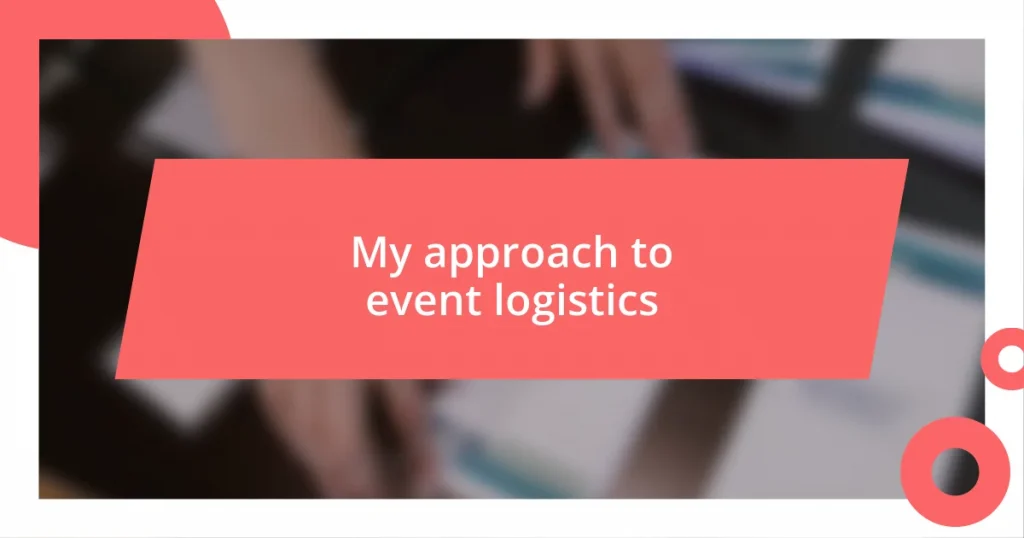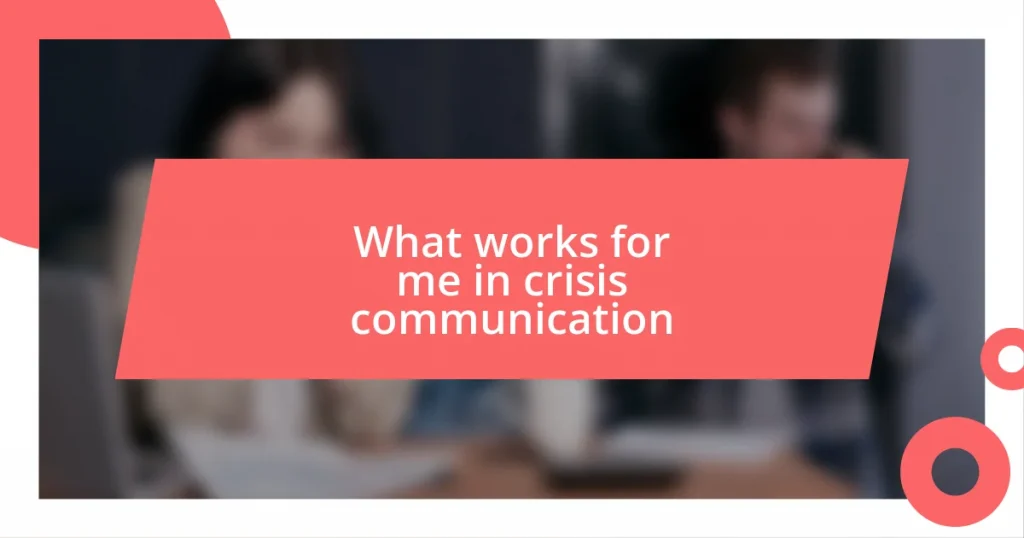Key takeaways:
- Effective event logistics require meticulous planning and communication, ensuring that all aspects, from timelines to resource management, are well-coordinated.
- Choosing the right venue involves balancing cost, accessibility, and versatility to create an engaging and efficient event experience.
- Post-event evaluations, incorporating participant feedback, are crucial for continuous improvement and refining logistics for future events.
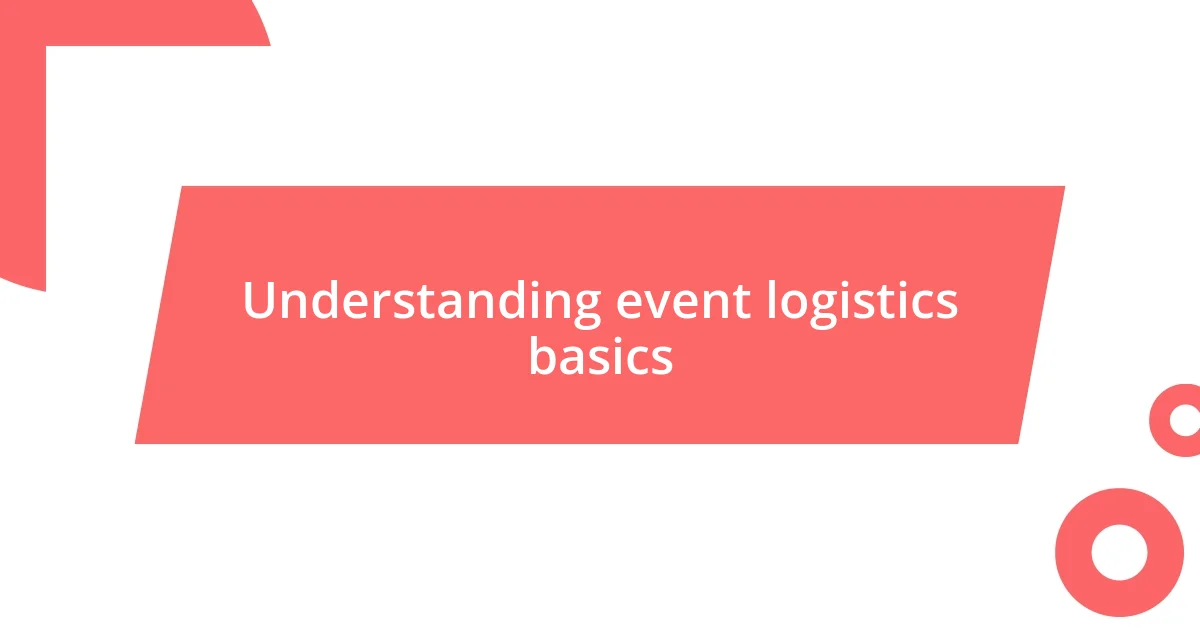
Understanding event logistics basics
Event logistics is essentially the backbone of any successful gathering. It involves coordinating all the moving parts, from venue selection to transportation and equipment setup. I remember my first big event; I was overwhelmed at first. The thrill of seeing everything come together, however, made it a rewarding experience. Can you imagine managing all those details and then witnessing the excitement of attendees?
At its core, understanding the basics of event logistics means recognizing the importance of planning and communication. A solid plan helps to anticipate challenges and streamline processes. I once faced a logistical hiccup when a speaker’s flight got canceled. But a quick call and reorganization led to a seamless transition. Isn’t it fascinating how effective communication can turn potential chaos into order?
An essential factor in event logistics is resource management, including time, budget, and personnel. I learned this vital lesson the hard way when I overlooked meal planning for a half-day conference. The unexpected scramble for food reminded me how crucial every detail is in the logistics puzzle. Have you ever faced a similar challenge? It’s those moments of realization that deepen your understanding of the logistical landscape.
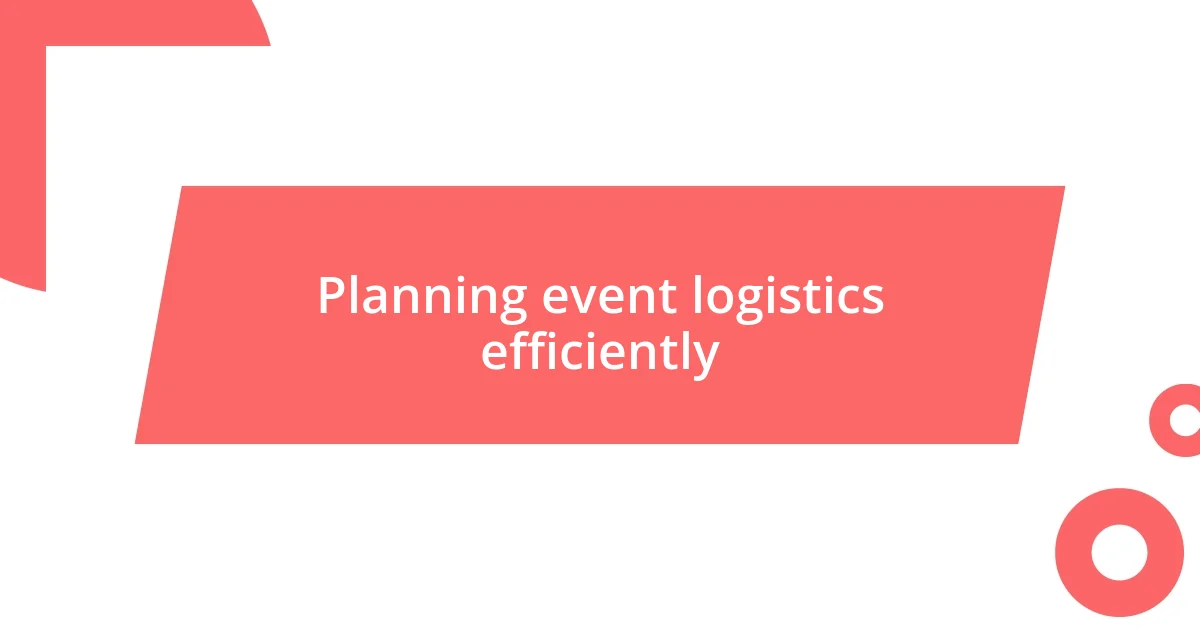
Planning event logistics efficiently
When planning event logistics efficiently, I’ve found that starting with a clear timeline is paramount. It’s like laying down a roadmap for the journey ahead. During my first conference, I created a checklist, which helped immensely in ensuring every detail was accounted for. Without that structure, I genuinely believe I would’ve been lost among the chaos.
Some key elements to consider include:
- Define Your Objectives: What do you want to achieve? This shapes every decision.
- Create a Detailed Timeline: Break down tasks week by week.
- Budget Wisely: Allocate funds where they are most needed.
- Engage with Vendors Early: Building relationships can ease negotiations.
- Communicate Clearly: Keep all stakeholders in the loop to avoid surprises.
I’ve learned that the more detailed and organized you are from the outset, the less likely you are to face unexpected surprises that can derail your event. There was a time I underestimated the importance of check-in systems, and the resulting chaos at the entrance taught me to prioritize attendee flow and experience. It’s those little details that can elevate an event from just okay to unforgettable.

Choosing the right venue
Choosing the right venue can honestly make or break an event. I remember planning a community gathering and settling on a quaint local hall. It had charm, but it wasn’t accessible for many attendees. That taught me the importance of considering not just aesthetics, but also the practicality of the location—facilities, parking, and accessibility can greatly influence attendance and engagement.
When selecting a venue, I’ve learned to prioritize versatility. On one occasion, I booked a spot that offered both indoor and outdoor spaces. This flexibility was invaluable when we faced unexpected weather on the event day. We smoothly transitioned activities outdoors to indoors without a hitch. Have you ever wished for such versatility at your events? I can say, it was a relief to accommodate attendees seamlessly without them even noticing the change.
Cost is another critical factor in venue selection, though it should not be the only consideration. In previous events, I opted for budget-friendly spaces, only to later realize they came with limitations in services and equipment. Paying a bit more upfront can often save time and stress later. Investing in the right venue is like investing in the event itself—it sets the tone for everything that follows. I still remember how the right backdrop can leave attendees feeling excited and engaged, creating lasting memories.
| Factor | Considerations |
|---|---|
| Accessibility | Ensure the venue is easy to reach for all attendees, with adequate parking and transport links. |
| Versatility | Look for venues with adaptable spaces for different activities or backup plans for weather. |
| Cost | Evaluate how the price aligns with the services offered; don’t skimp on critical elements. |
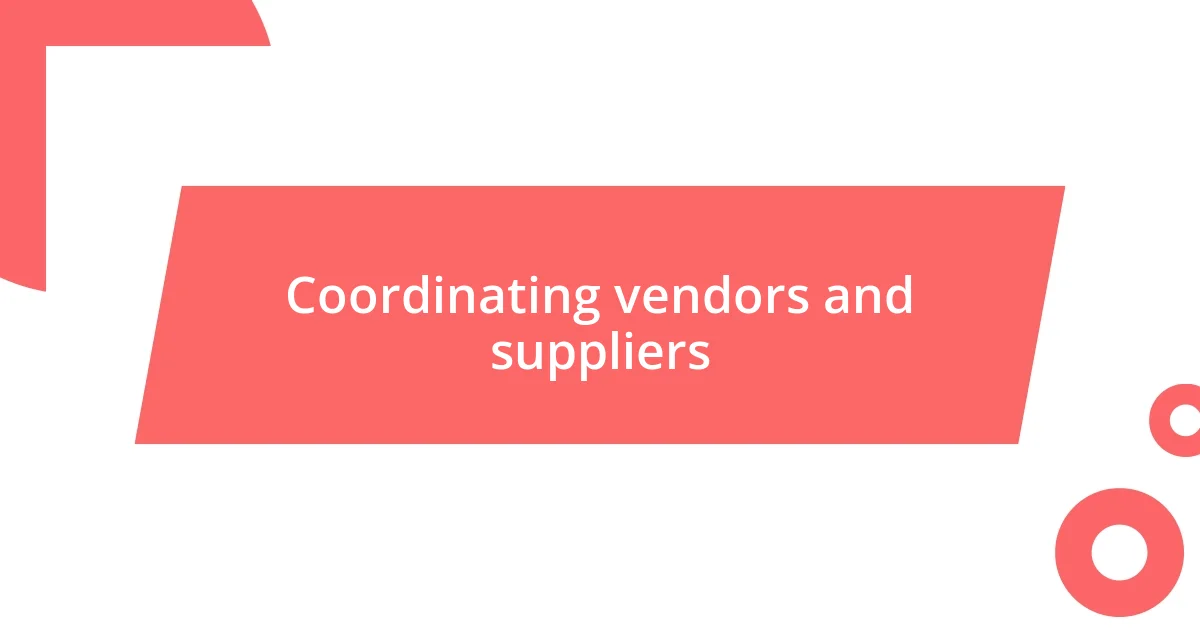
Coordinating vendors and suppliers
Coordinating with vendors and suppliers is one of the most vital aspects of event logistics. I recall an event where I had to juggle multiple vendors—caterers, tech crews, and decorators—all at once. It felt overwhelming, but I learned that keeping open lines of communication made all the difference. When I scheduled regular check-ins, it helped everyone stay on the same page and anticipate any potential hiccups.
I always try to establish strong relationships with my vendors early on, as it fosters trust and collaboration. One time, a last-minute change in the guest count created a panic with our catering team. However, because I had built rapport with the caterer, they accommodated our needs seamlessly, even finding innovative solutions on the fly. Have you ever had to rely on a vendor’s quick thinking? It’s moments like those I truly appreciate the value of partnership.
Another lesson I’ve learned is the importance of clear contracts that outline expectations. I once assumed a supplier knew what I needed, leading to an unfortunate mishap with outdated equipment on event day. Since then, I’ve made it a point to go through every detail with my vendors before the event. It’s a practice I recommend; it not only avoids stress but also empowers everyone to do their best work, knowing they are well-informed.
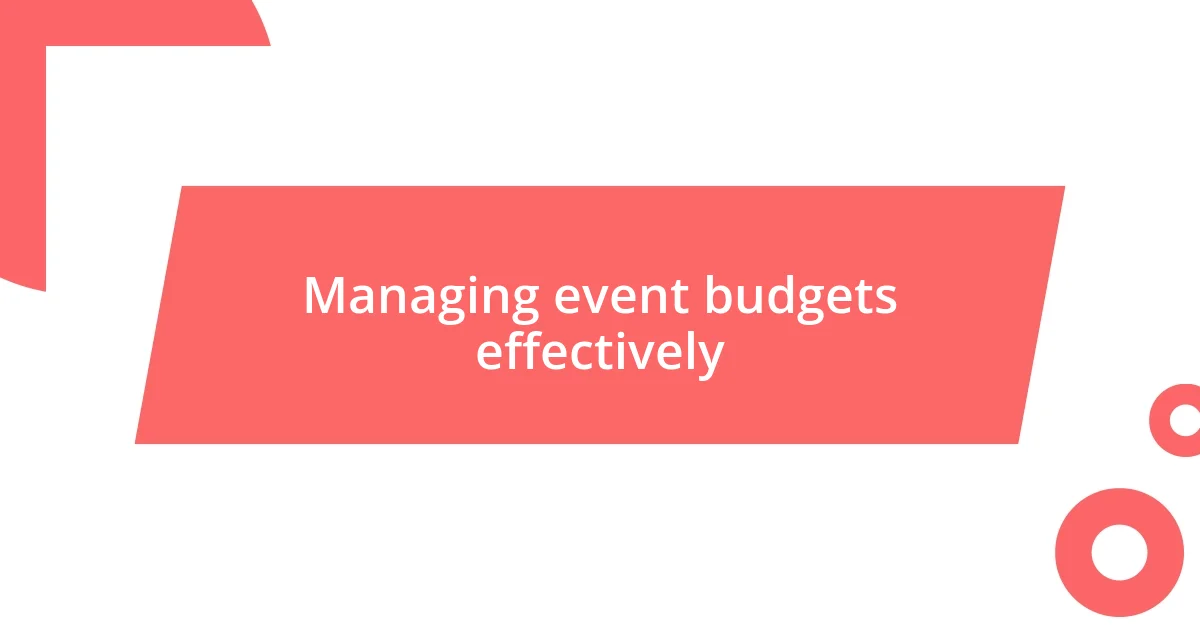
Managing event budgets effectively
Managing an event budget effectively can feel like walking a tightrope. I remember the excitement of planning one event; I had a vision that I got carried away with, leading to a budget that spiraled out of control. Now, I always stress the importance of creating a detailed budget from the start. It helps me allocate funds wisely and avoid that gut-wrenching moment when you realize you’re way over the limit.
A practical tip I’ve learned is to include a buffer for unexpected expenses. This isn’t just a suggestion; it’s a necessity! During one event, a sudden rise in materials cost nearly derailed us. Fortunately, I had preset a small percentage of the overall budget as a safety net, which allowed us to adapt without panic. Have you experienced a stressful budget scenario? Having a buffer can make all the difference in keeping the planning process smooth and enjoyable.
Finally, I always review and adjust my budget as I go. It’s so easy to let emotions drive spending, especially when an opportunity looks too good to pass up. I once almost overspent on fancy centerpieces that caught my eye at the last minute. Keeping a close watch ensures I stay aligned with my financial goals, allowing for flexibility while still maintaining control. This way, I can focus on creating memorable experiences instead of worrying about my bank account!
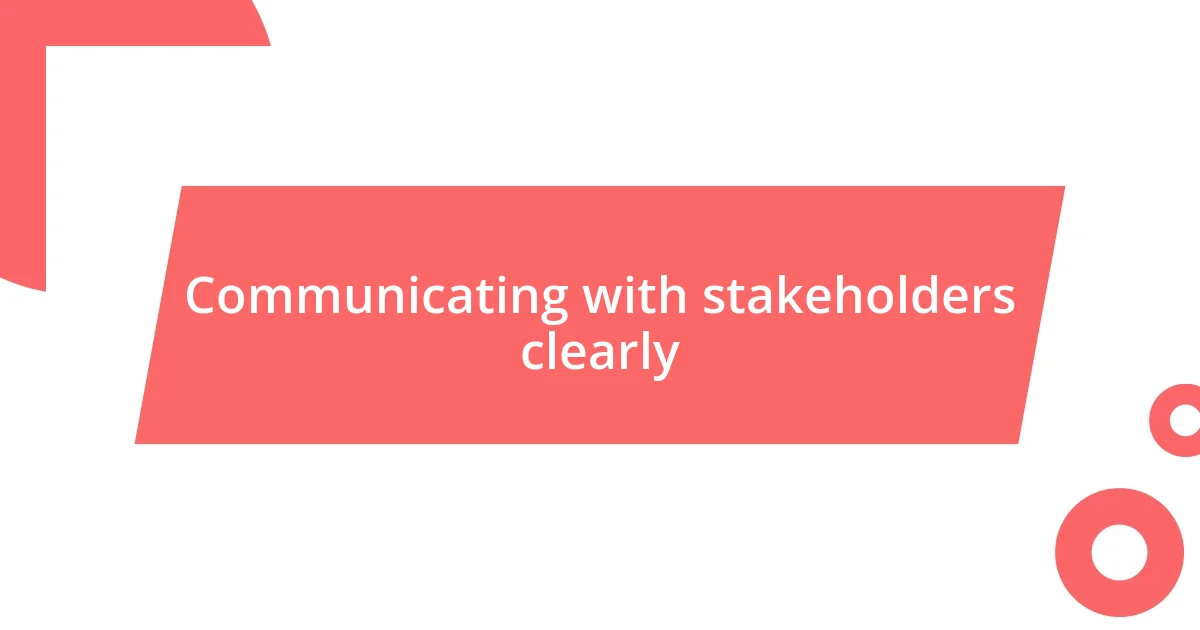
Communicating with stakeholders clearly
Clear communication with stakeholders is absolutely essential in event logistics. I once found myself in a situation where I hadn’t communicated a change in the schedule to all stakeholders, and it resulted in confusion on the day of the event. That moment made me realize how crucial it is to keep everyone in the loop; a simple email or message can save a lot of stress down the road. Have you ever experienced the fallout from a lack of communication?
I’ve learned the importance of being proactive about sharing information, especially when it comes to timelines and responsibilities. During one event, my team and I decided to use a shared project management tool, allowing everyone to track their tasks and updates in real time. This visibility not only empowered each individual but also fostered a sense of teamwork. I believe that when everyone knows what to expect, it alleviates confusion and helps maintain positive energy throughout the planning process.
Regular updates are another key aspect of clear communication. I remember how a simple weekly newsletter I sent out became a cornerstone for managing my stakeholders’ expectations. It became a platform for sharing progress, addressing concerns, and celebrating small wins. It was rewarding to see how being transparent about challenges created a collaborative atmosphere, turning potential roadblocks into opportunities for problem-solving together. Have you tried a similar approach? It might just enhance your stakeholder relationships significantly!
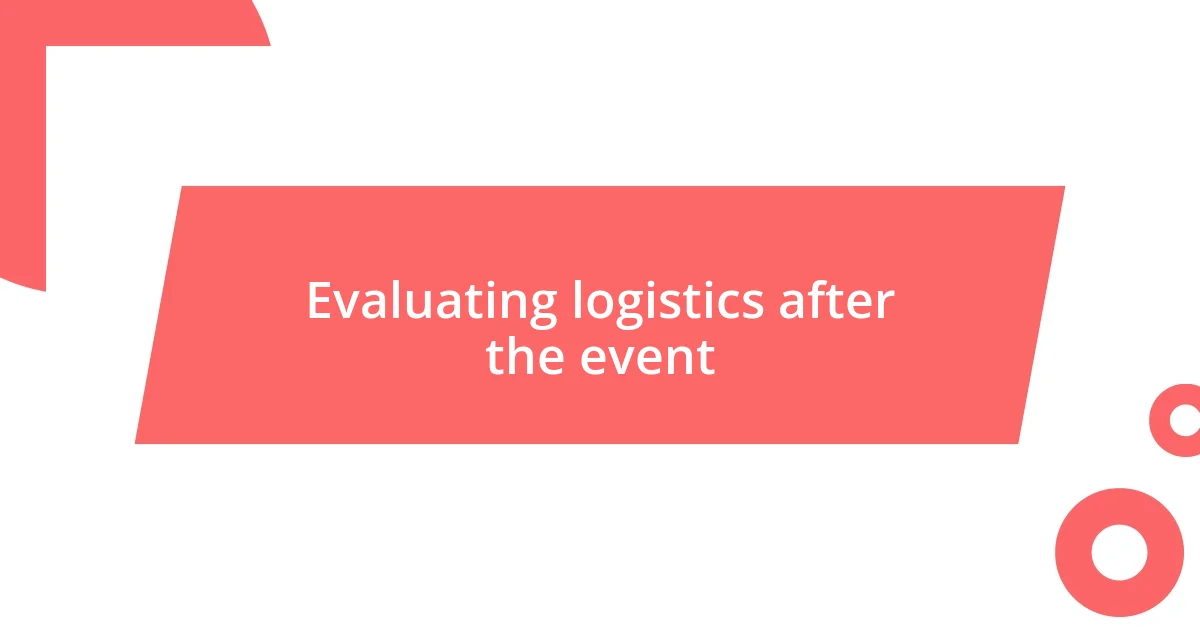
Evaluating logistics after the event
Evaluating logistics after an event can reveal a treasure trove of insights for future planning. After one significant conference, I gathered my team for a post-event review, and we dissected everything from the venue’s accessibility to supplier reliability. I remember feeling a mix of relief and anxiety as we went through our notes; it was enlightening to hear everyone’s perspectives and identify both successes and areas needing improvement.
I often incorporate participant feedback into my evaluations, as this adds a layer that internal assessments sometimes miss. For instance, during a recent event, I distributed quick surveys to attendees that focused on their experiences with set-up and catering services. Knowing that our participants felt delays in food service added a personal touch to our evaluation. Their feedback wasn’t just numbers; it was a reminder that logistics impact the overall experience, which is priceless in event planning.
With all this information, I also like to create an actionable checklist for my next event. Reflecting on what worked well and what didn’t helps me formulate this guide for improvement. I recall how noting the challenges we faced with transportation logistics during a festival shaped my approach for subsequent collaborations, allowing me to plan more effectively and avoid repeating mistakes. Have you ever considered how these evaluations could serve as stepping stones for continuous enhancement? Trust me; they can transform your logistical planning into a well-oiled machine!










